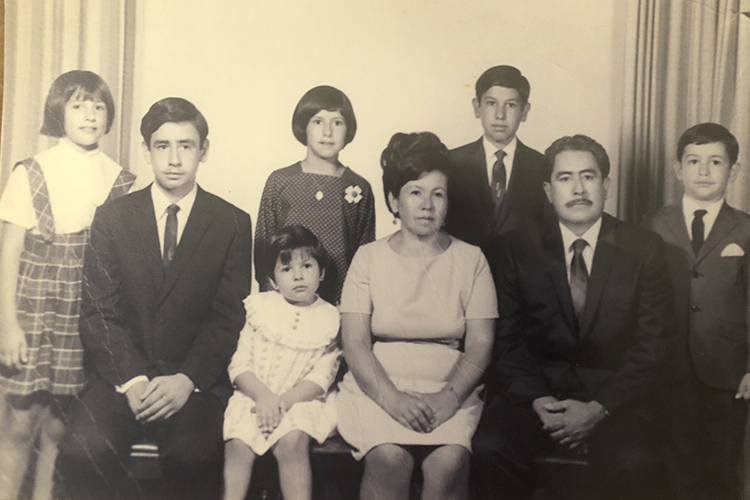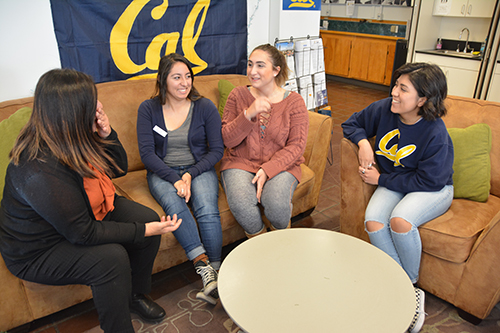
Lorena Valdez has directed UC Berkeley’s Transfer Student Center for 27 years, building a community she loves to serve. (UC Berkeley photo)
I grew up in East Los Angeles, the youngest of six siblings — three boys and three girls.
My parents are originally from Mexico, from the areas of Monterrey and Durango. That is where they met and got married. My three older siblings were all born in Mexico, and the three youngest were born in East L.A.
As children, we grew up Catholic. My parents worked several jobs to put all of us through private schools.

Lorena Valdez, pictured here when she was 9 years old, attended Our Lady of Loretto Elementary School in Los Angeles. Education was stressed in her family from a young age. All six of her siblings would go on to earn college degrees. (Photo courtesy of Lorena Valdez)
My father was in the meatpacking industry for over 30 years. He worked long days in a slaughterhouse ripping and cutting open the carcasses of cows. It was physically brutal work, and he would sometimes come home with really big cuts on his hands and arms.
When I started fifth grade my mother began working at the cafeteria at my school, which, at the time, was just horrifying to me. “Why is my mother following me?” I would think.
But she was there at that school for over 30 years. It was definitely a way for her to connect with the broader community and to really be present for the kids, serving them meals every day. She saw generations of kids grow up throughout the years.
She hated retiring from that job because she loved what she was doing.
Those values of education, hard work and community were instilled in me at a young age.
But my parents were also very strict and traditional. They didn’t have the chance to go to private school so we were expected to take advantage of the opportunities they were giving us.
There was no missing school. If you missed school you better have a doctor’s note or some real reason you did not go to school that day.
There was no going to parties or dances, and no sleep overs: “Why would you sleep at someone else’s home? You have your own home and you sleep in that home,” my parents would say.
I sometimes felt like I was living in this little cocoon, and I was really of the mind to break out to try something new.
When I was a senior at Sacred Heart of Mary High School in Montebello, I didn’t think it was possible to go away to college. For me and my sisters, young women only left their families when they got married.
But when my older brother went away to college at Santa Clara University, and graduated, I started to think that leaving home for school was a possibility.
There was a family friend who had gone to Berkeley, and I remember one time my mother was kind of like, challenging me, saying “Ava went to this really good school up north in Berkeley,” and Ava did this and that… So, I applied.

Lorena Valdez, then 5, is shown here (left of center) with her parents Macedonio and Betha Valdez. Her five older brothers and sisters, Frank, Sal, Bertha, Elida and Arturo went on to college while Lorena stayed at home with her mother as the youngest child. They created a close bond, and her mother, who is now 93, continues to receive frequent visits from all of her children. (Photo courtesy of Lorena Valdez)
At that time, Berkeley had a program that was called “In the Field Admissions.” Admissions officers would go to your high school and they would admit you on the spot.
One day, I was called in to sit with Roberto Rivera, who was Berkeley’s admissions advisor at that time. He came to see my application. He reviewed it, he asked me a few questions, and we had a conversation.
At the end of the meeting he said, “You’re in.”
And I was like, “what?” He said it again: “You’re in.”
I went home, I told my brother and he didn’t believe me until I got the admissions letter in the mail. My parents, especially my mother, kind of had this fear for my safety being away from home, but they supported me in getting my education.
That first year, I didn’t do well. I was struck by how different it was for me. I went to schools that were 98% Latino. I’d never gone to school with African American students, and at Berkeley there were a lot of white students, so it took me some time to really kind of find my bearings.
I also didn’t know what I wanted to study.

UC Berkeley’s Student Learning Center was where Lorena Valdez began supporting the campus community as a student tutor. Valdez started the Transfer Student Center while still working at the learning center. (UC Berkeley photo)
I took a literature course my second year, and I knew as soon as I was done in that first lecture that I was going to be an English major. The depth of the course really opened up something inside of me. It was that feeling that literature can transcend so many things from culture to history to all these universal truths that everyone holds.
I also took Chicano studies classes that helped me to understand my own identity, and the historical and political context of my community: How my parents’ experience as immigrants fit into it all.
Those two worlds of study coming together helped me find myself in a way. It was really meaningful, and gave me some focus and direction that led me to succeed academically.
As an English major, I really wanted to get involved in tutoring. I wanted to help students that went through similar struggles to find their voice, and build up some confidence.
What really ended up happening, is they helped me.
We transformed each other’s experiences through dialog, through learning, through exploring language in the way words come together to form sentences and ideas. And, I really grew passionate about my work supporting others.

Lorena Valdez (left), with student staffers Miriam Lagunas, Rosemary Karapetyan and Aurelia Mora Comacho. Prior to the pandemic, students would meet at the center for support. Now, services have moved online. (UC Berkeley photo by Hulda Nelson)
It’s not only a way of giving, but a way of receiving something really meaningful in return. That really led to my career now as the director of Berkeley’s Transfer Student Center.
It’s still very much about that exchange.
I helped to start the center more than 20 years ago, and for a long time, 15 years, it was just me and student employees I would hire. But we’ve grown to really help support transfer students on campus the same way I helped students at the learning center when I was a student.
Being the first in the UC system to create a transfer center has really given us a chance to learn and to build on what students have taught us about what they need. That has really helped us to design what we do in a hopeful and meaningful way.
We’ve really built a community for transfer students where we can meet and advise them on anything they need support with. These students have inspired me by their stories and courage. To work with them has been a blessing and a privilege. Really, an honor.
I’ve been with Berkeley now for 27 years, and I feel like I grew up on this campus personally and professionally. To be in an educational setting with incredibly talented young people all the time, and having been a little part of their journey — it just transforms your life.

Transfer Student Center Director Lorena Valdez “has been a visionary for transfer student support from day one,” said Fabrizio Mejia, assistant vice chancellor for student equity and success. (UC Berkeley photo by Irene Yi)
I am the person I am today because of this work: Grounded, grateful, humble, but always striving to do my best for the students.
My brothers and sisters have also worked in education. It’s a career and a calling that runs in my family because of the values my parents gave us.
I hope to do the same for my students. I want to help them find happiness and satisfaction by aligning their values and interests with the work that they do.
And that’s why I’m still in the game.
This is work that I feel is important and meaningful to me personally. Helping students feel empowered to succeed, achieve and dream big: That’s what I want for my Berkeley community.
"still" - Google News
September 30, 2020 at 02:18AM
https://ift.tt/33cWcmJ
I'm a Berkeleyan: Lorena Valdez is 'Still in the game' of doing what she loves - UC Berkeley
"still" - Google News
https://ift.tt/35pEmfO
https://ift.tt/2YsogAP
Bagikan Berita Ini














0 Response to "I'm a Berkeleyan: Lorena Valdez is 'Still in the game' of doing what she loves - UC Berkeley"
Post a Comment